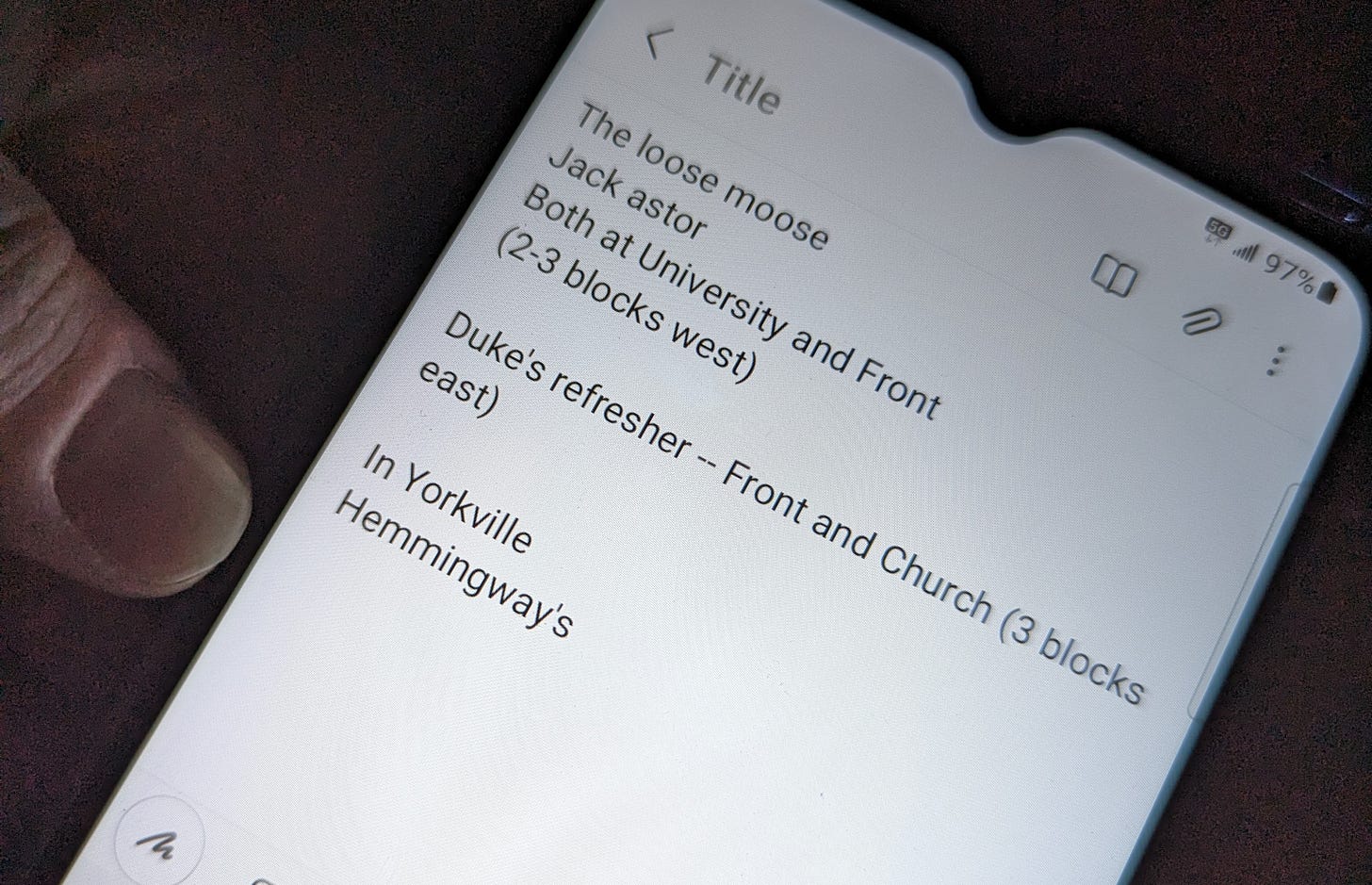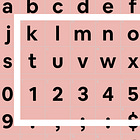#702: Fake friends, cloned voices and reckless scams
Plus a dispatch from the Death Cab/Postal Service tour, where most people nailed concert phone etiquette
Last weekend Jason and I trekked to Toronto for the Death Cab/Postal Service tour, a 32-city nostalgia trip for elder millennials who once crushed on Seth Cohen and burned mix CDs with titles taken from Bright Eyes songs.
No one in the half-filled, 20,000-seat stadium looked much younger than 30 or older than 48. To find the entrance to the Scotiabank Arena — which was obscured by a massive outdoor viewing party for that night’s Leafs/Bruins game — we followed a single-file stream of men in plaid flannel and women in leather jackets who had clearly hired babysitters and come to party.
The highly specific generational demographics of this crowd lent themselves to a sort of ad hoc natural experiment. I don’t see a ton of stadium shows, but I did catch the Goo Goo Dolls last time they came through Buffalo, and last September we blew a single mortgage payment on two highly coveted Taylor Swift tickets.
The Swifties skewed young, as you might imagine: We sat between two feverish high school girls who live-streamed Swift’s whole set … in selfie mode.
The crowd at the Goo Goo Dolls, meanwhile, was generally old enough to parent the Swifties, but exhibited a similar documentary urge. The woman to my right, as I recall, watched the show primarily on her phone, shakily pinching and zooming the frame until she captured a tiny, overexposed John Rzeznik clear enough for a Facebook post.
But at a concert where people were young enough to know *how* to use their devices — and old enough to realize they didn’t need to — the rows around us were blessedly dark, phones safely stowed in pockets and purses.
From my eagle-eyed perch deep in the nosebleeds, I surveyed the crowd for the telltale blue-white glow … but I found it only here and there, in isolation, as people snapped one-off photos or checked the Leafs score.
The one off note, if you’ll allow me that mediocre pun, came from the conspicuous Boomer seated to my left: She didn’t know the bands, she bought her ticket on a whim, and she had lots of thoughts about Americans. (“You blend right in!” she told me at one point, with shameless and frankly illogical condescension.)
At some point during the Postal Service set — presumably after she discovered that we were, in fact, Canadian-passing visitors — she got to work composing an unsolicited list of bars for us to hit after the show ended. Her phone was turned up to full brightness. She tapped out each line verrrry slowwwwwly. When finished, she whisper-screamed past me, at Jason, to take pictures of her screen.
Blinded momentarily by the light — as lyrics about answering machines reverbed past me, for God’s sake — I found myself thinking that I was simultaneously too young and too old for this tomfoolery. We thanked our neighbor for her recommendations (Canadian-passing, remember!) but were relieved when she loudly pronounced herself “bored” and left before the show ended. 😑
Thanks again for making the relaunch such a blast
The past week has exceeded all hopes/expectations. My parents even took me for a nice dinner last night to celebrate, which represents a tremendous and profoundly validating evolution in my mother’s understanding of what I do for a living.
Continued thanks to everyone who hyped the Links relaunch, bought me a coffee or sent a kind note — and EXTRA thanks to the hundreds (!) of wonderful people who upgraded their subscriptions. Your support will make it possible for me to spend more time on original writing, reporting and analysis. You can read more about that here. And in case that’s not adequately persuasive, let’s also trot out the parade of additional subscriber offerings:
Free access to links from The New York Times, The Washington Post and The Atlantic, courtesy those outlets’ gift article programs
Early access to experiments and features, including a likely online book club
All posts to IRL, my nascent personal blog
A free link on your birthday (I bought a *paid subscription* to an ecard site for this, and I’m not even sure I can write that off.)
Take it from long-time and v. grown-up subscriber Rijo, who upgraded to paid this week: “I want to put my big boy pants on and say I'm using my money to support things that matter to me!!”
If you read anything this weekend
“The Package King of Miami,” by Ezra Marcus for New York. Matt Bergwall is a brainy 22-year-old beanpole and the natural terminus of trend that began with WallStreetBets: In 2022 and 2023, the then-college sophomore pulled off a sophisticated $5-million package-return scam that bought him Teslas, Rolexes, vacations to Dubai and, eventually, a federal fraud indictment. Bergwall’s story alone is absolutely wild — in typically late-teenage fashion, he’s both amazingly bright and deeply, stupidly reckless. But his saga also speaks to our larger, increasingly spammy culture, both online (think: sports betting, crypto, many “influence” schemes, other promises of easy, independent wealth) and off it (surely there’s no greater scam than our rigged/gilded economy — on full display in Miami, where Bergwall lived).
“My Journey Inside the Voice-Clone Factory,” by Charlie Warzel for The Atlantic. AI-generated voices are interesting for a few reasons: The technology is already very convincing and widely socialized, arguably more so than in images or text, and its harms are concrete, present and not at all hypothetical, given the rise of deepfaked election robocalls and fake-kidnapping scams. Just as importantly, perhaps, the companies at the cutting edge of voice-cloning industry are tiny, independent start-ups, unencumbered by reputations, shareholders or other typical guardrails that might slow down the pace of their “innovations.” Warzel, visiting some of these innovators at their oddly sparse offices in London, finds them “thoughtful,” “kind” and “introspective,” and still feels deeply unsettled by them. I’m also disquieted by the thought that such profound techno-cultural disruptions lie within such easy reach of small, unregulated teams. No offense to the ~kind and thoughtful~ guys — always guys! — at ElevenLabs, but this conjured memories of the ClothOff app for me.
“Sports Is Betting It All On Gambling,” by Corbin Smith for Defector. I’m so fucking disgusted by the expansion of sports betting and state governments’ spineless complicity in it — a situation that Smith argues, very convincingly, will soon be understood as a full-blown public health crisis. Problem gambling is not an uncommon disorder: Roughly one percent of Americans have it. Gambling addicts are 15 times more likely to commit suicide than the general population. And FanDuel and DraftKings and all their slick, predatory ilk are specifically designed — via personalized, real-time feeds, constant visual and auditory stimuli, aggressive promotions and assorted in-app dark patterns — to hook into the brains of addicts. At PointsBook, a sports gambling app owned by Fanatics, half a percent of all customers generated 70% of company revenue in a two-year period. Truly, forget the panic around teens and social media — this is the more urgent exploitation.
“The Hidden-Pregnancy Experiment,” by Jia Tolentino for The New Yorker. The titular “experiment” here is a liiiittle overhyped: Tolentino essentially didn’t Google baby stuff for the first half of her pregnancy, then abandoned the gag when it worked as she hoped it might. But the experiment makes a good frame for a fascinating, wide-ranging discussion of the many ways that people, especially parents, trade their personal privacy and the privacy of their loved ones for any assurance that they’ll be safe or comfortable. See, for instance, “smart” baby socks, GPS strollers, Ring doorbells, invasive pregnancy-tracking apps, and — increasingly, alarmingly — the growing surveillance of pregnant people.
“The Teens Making Friends With AI Chatbots,” by Jessica Lucas for The Verge. I think AI companions are already far more widespread than most people realize — per Lucas, “millions” of young people have created chatbot friends and lovers on platforms including Character.AI. There’s a knee-jerk tendency to squirm over or reject those relationships — who are these losers, can’t they make real friends, <insert Black Mirror reference>, etc. — but Lucas is typically sensitive and open-minded in her conversations with teenagers and experts who argue AI companions can cut either way, depending on the user. For more on this, see also Kevin Roose’s latest first-person stunt, where he makes 18 AI friends and concludes that chatbots “could enhance human socializing, rather than displace it.”
In case you missed it
The most-clicked link from last Saturday's round-up was this essay on the cringiness of millennial humor, which is why I felt empowered to display some rare generational snobbery in this week’s introduction.
The Wednesday edition concerned the creeping convergence of online aesthetics, primarily in the niche realm of corporate typefaces … but also more broadly across areas of design including website layouts and app interfaces.
The Verge has a story this week on the untimely demise of the smart home startup Brilliant, which — as Jennifer Pattison Tuohy and Victoria Song punnily explain — “could mean lights out for its light switches.” This was a bit triggering for me, a deeply reluctant Insteon customer who lost control of my porch light for nigh on 10 months when that smart home startup also flamed out. Both Insteon and my porch light are back up, for now, and I wish the same good fortune on Brilliant customers.
Postscripts
Temu explained. Depression surveilled. Taylor Swift danceability graphed. I dearly love the conceit of a chess story where the writer plays/loses to every interview subject. The war crime influencer and the YouTube war recruiter. Why kids don’t read for fun these days. “Well-intended as it may be, ‘dead mom’ marketing rubs me the wrong way.” Same!
Inside libraries' battle for better e-book access. Offline with the young retirees of r/FatFIRE. How TikTok changed fashion and how TikTok Shop made a bad, obscure book a bestseller. The booming Chinese market for deepfakes of the dead. Bad omens for my beloved Peloton. Today’s rap battles play out in meme campaigns, not just in (legally actionable?) songs.
What do trigger warnings actually do? Are these people not aware of dedicated sleep podcasts? Pinterest as self-care, tweet deletion as self-preservation, and an alarmingly literal internet thirst trap. I enjoyed this great and grimly funny distillation of Elon Musk’s awful ideology. I cannot, as a former agriculture reporter, urge you to avoid raw milk more forcefully. Last but not least, on the subject of Gen Z’s preoccupation with lip gloss, Botox and “skincare” writ large: less “an obsession with aging” than “an obsession with emulating their digital avatars.”
Until next week! Warmest virtual regards,
Caitlin








"I found myself thinking that I was simultaneously too young and too old for this tomfoolery."
Tomfoolery is a word whose time has come for a revival. Also poseurs.
Those bar recommendations are the booze equivalents of Olive Garden and I hope you didn't go to any of them.